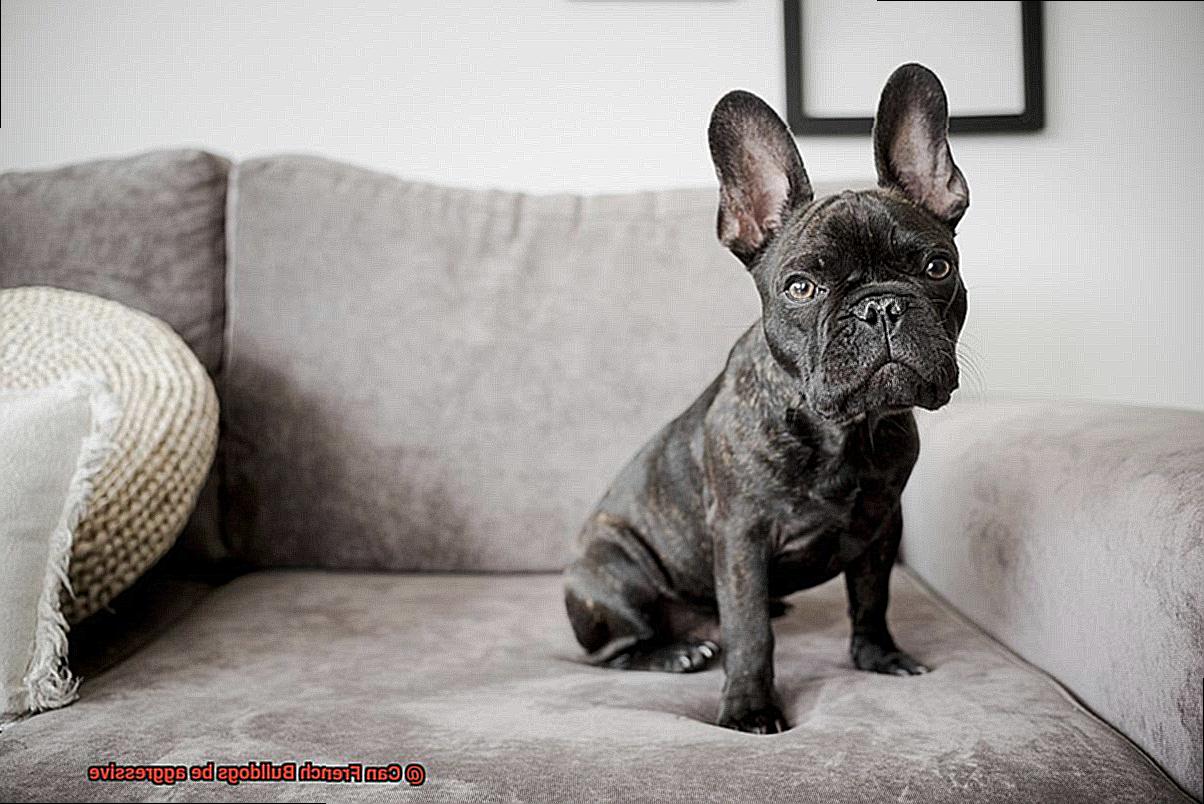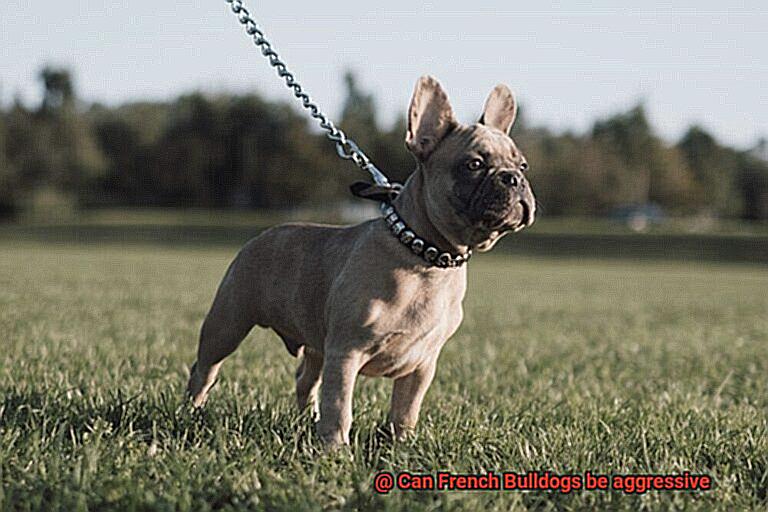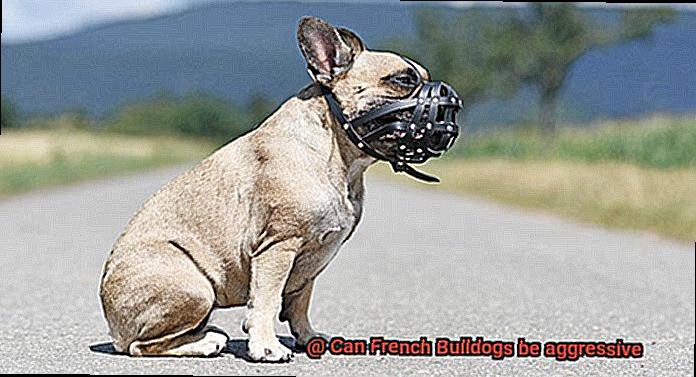Can French Bulldogs be aggressive?
When you picture a French Bulldog, don’t you just want to squeeze those cute, bat-like ears and get lost in their soulful puppy eyes? These little bundles of joy are famous for their loving and gentle nature, but there’s been some talk about aggression that has left even experienced dog owners scratching their heads.
In this blog post, we’re diving deep into the question: Can French Bulldogs be aggressive? We’ll uncover the real deal, dig into what might cause any potential aggression, and give you a well-rounded understanding of these lovable companions. So grab your favorite mug of coffee and let’s unravel the mystery behind these adorable pups.
Factors that Contribute to Aggression in French Bulldogs
Contents
- 1 Factors that Contribute to Aggression in French Bulldogs
- 2 Signs of Aggression in French Bulldogs
- 3 Socialization and Training for French Bulldogs
- 4 Responsible Breeding Practices to Reduce Aggression in French Bulldogs
- 5 How to Handle Aggressive Behavior in French Bulldogs
- 6 Common Misconceptions About Aggression in French Bulldogs
- 7 Professional Help for Dealing with Aggressive Behavior in French Bulldogs
- 8 Conclusion
French Bulldogs are beloved companions known for their friendly and affectionate nature. However, just like any other breed, some French Bulldogs may display aggressive behavior. In this article, we will explore the various factors that contribute to aggression in French Bulldogs, providing you with valuable insights to help you understand and address any potential aggressive tendencies in your furry friend.

Genetics:
Genetics play a significant role in determining a French Bulldog’s temperament. Some French Bulldogs may inherit certain genetic traits that make them more prone to aggression. It is crucial to understand the lineage and history of a French Bulldog before bringing them into your home. Responsible breeding practices can help reduce the likelihood of aggression in French Bulldogs.

Lack of Socialization:
Proper socialization is vital for all dogs, including French Bulldogs. If a French Bulldog is not exposed to different people, animals, and environments from a young age, they may become fearful or defensive, leading to aggressive behavior. To prevent aggression, it is important to expose them to a variety of situations and provide positive experiences.
Fear and Anxiety:
Just like humans, dogs can exhibit aggression as a response to fear or anxiety. If a French Bulldog feels threatened or overwhelmed in certain situations, they may react aggressively as a defense mechanism. Identifying and addressing the underlying causes of fear or anxiety can help prevent aggression.
Lack of Training and Discipline:
French Bulldogs that lack proper training and discipline are more likely to display aggressive behaviors. Without clear boundaries and consistent training, they may develop dominant tendencies or exhibit territorial aggression. Establishing yourself as a fair leader through positive reinforcement training methods is essential.
Health Issues:

Aggression in French Bulldogs can sometimes be attributed to underlying health issues. Pain or discomfort caused by medical conditions can lead to irritability and aggression. Regular health check-ups and monitoring your French Bulldog’s well-being are crucial in preventing aggression related to health problems.
Resource Guarding:
Some French Bulldogs may exhibit aggression when it comes to protecting their resources, such as food, toys, or their sleeping area. Resource guarding can stem from a lack of trust or insecurity. Building trust with your French Bulldog and using positive reinforcement techniques can help address this behavior.
Lack of Exercise and Mental Stimulation:
A bored and frustrated French Bulldog may channel their energy into aggressive behavior. Regular physical exercise and engaging activities are essential for preventing aggression. Providing mental stimulation through puzzle toys or training sessions also helps keep them mentally sharp and content.
Previous Traumatic Experiences:
French Bulldogs that have had past traumatic experiences, such as abuse or neglect, may be more prone to aggression. These negative experiences can leave lasting emotional scars. Providing a safe and loving environment to rebuild trust is vital in alleviating aggressive tendencies.
Signs of Aggression in French Bulldogs
French Bulldogs are generally known for their friendly and outgoing personalities. However, like any dog breed, some individuals may display signs of aggression. It is important for owners to be aware of these signs and understand how to handle them appropriately. Here are some common signs of aggression in French Bulldogs:

- Growling or snarling: When a French Bulldog growls or snarls, it is their way of expressing discomfort or warning others to stay away. This behavior should never be ignored or dismissed, as it can escalate if not addressed properly.
- Snapping or biting: If a French Bulldog feels threatened or if their personal space is invaded, they may resort to snapping or biting. It is essential to teach them appropriate boundaries and socialize them from a young age to minimize the risk of aggressive behavior.
- Defensive body language: Raised hackles, stiff posture, and staring are common signs that a French Bulldog is feeling defensive or aggressive. Understanding these cues can help owners intervene before the situation escalates.
- Resource guarding: Some French Bulldogs may display aggression when it comes to resource guarding. This occurs when they become possessive over their food, toys, or even their owners. Early intervention and teaching them that resource sharing is acceptable is crucial.
- Fear aggression: French Bulldogs may become aggressive when they feel frightened or threatened. It is important to identify the triggers and provide a safe environment for them to alleviate this type of aggression.
It is vital for owners to differentiate between playfulness and aggression in French Bulldogs. While they are known for their playful nature, it should never cross the line into aggressive behavior. Supervision and proper training can help ensure that play stays within acceptable boundaries.
If you notice any signs of aggression in your French Bulldog, it is recommended to consult with a professional trainer or behaviorist. They can assess the situation, identify the underlying causes, and provide guidance on how to address the aggression effectively.
It is worth noting that aggression in French Bulldogs can sometimes be a result of underlying health issues or pain. Therefore, it is crucial to rule out any medical causes before addressing the behavior.
With proper training, socialization, and a loving environment, most French Bulldogs can live happy and non-aggressive lives. Being proactive in preventing and addressing any signs of aggression will ensure the well-being of your furry companion.
Socialization and Training for French Bulldogs
French Bulldogs are adorable and full of personality, but like any other breed, they require proper socialization and training to prevent aggression issues. In this section, we’ll delve into the importance of socialization and training for French Bulldogs, providing you with valuable insights and techniques to raise a well-rounded and happy Frenchie.
The Power of Early Socialization:
- Expose your Frenchie to different environments, sounds, sights, and smells from a young age.
- Encourage positive interactions with other dogs, animals, and people.
- Gradually introduce new experiences to prevent fear or anxiety-based aggression.
Obedience Training: Setting Boundaries and Building Trust:
- Teach your Frenchie basic obedience commands such as sit, stay, come, and leave it.
- Consistency is key – short training sessions multiple times a day are more effective.
- Use positive reinforcement techniques such as praise, treats, and play to motivate your Frenchie.
Establishing Leadership:
- Establish yourself as the leader or alpha in the relationship with your Frenchie.
- This helps prevent dominance-related aggression and ensures they respect your authority.
Leash Training for a Polite Pooch:
- Proper leash training is essential to prevent leash aggression.<
- Teach your Frenchie to walk calmly on a leash and not react aggressively towards other dogs or people.
Seeking Professional Help when Needed:
- If you encounter behavioral issues or signs of aggression in your Frenchie, don’t hesitate to seek professional help from a certified dog trainer or behaviorist.
- They can provide customized training plans and advice specific to your dog’s needs.
Responsible Breeding Practices to Reduce Aggression in French Bulldogs
French Bulldogs are known for their friendly and affectionate nature, but aggression can still be a concern in some individuals. Responsible breeding practices play a crucial role in reducing aggression and ensuring the well-being of these beloved pets. In this article, we will explore the key practices that breeders should consider to promote non-aggressive behaviors in French Bulldogs.
Selecting Breeding Pairs:
- Breeders should carefully assess the temperament and behavior of both male and female French Bulldogs before deciding to breed them.
- Avoid breeding dogs with a history of aggression or any behavioral issues.
- Consider the temperament of previous litters produced by the potential breeding pair to ensure that aggression is not passed down through genetics.
Socialization:
- Early and extensive socialization is essential for reducing aggression in French Bulldogs.
- Expose puppies to various people, animals, and environments from an early age to develop good social skills.
- Provide a stimulating and enriched environment for the puppies, allowing them to explore and interact with different stimuli.
Training and Positive Reinforcement:
- Start training French Bulldogs from an early age using positive reinforcement techniques.
- Encourage new owners to continue with training to ensure their French Bulldogs grow up to be well-behaved and non-aggressive dogs.
- Establish consistent rules and boundaries to help prevent aggressive behaviors.
Health Screenings:
- Certain health conditions, such as pain or discomfort, can contribute to aggression.
- Conduct thorough health checks on breeding dogs to identify any potential underlying health issues that could cause aggressive behavior.
Ongoing Support and Education:
- Responsible breeders should provide ongoing support and guidance to new owners.
- Educate new owners on proper training techniques, socialization, and behavior management.
- Be available for any questions or concerns that may arise.
By implementing these responsible breeding practices, breeders can help reduce aggression in French Bulldogs and promote their overall well-being. Remember, it’s essential to prioritize temperament over other breeding considerations such as appearance or market demand.
Together, we can ensure that French Bulldogs remain the friendly, loving companions they are known to be.
How to Handle Aggressive Behavior in French Bulldogs
French Bulldogs are known for their friendly and affectionate nature. However, like any other breed, there can be exceptions, and some French Bulldogs may display aggressive behavior. Aggression in French Bulldogs can be influenced by a variety of factors including genetics, socialization, training, and individual temperament. It is important to note that aggression should not be generalized to the entire breed, as it can vary from dog to dog.
Aggression in French Bulldogs can manifest in different ways such as growling, snapping, biting, or displaying dominant behavior. If you notice any signs of aggression in your French Bulldog, it is crucial to address the issue promptly to ensure the safety of both your dog and those around them.
The first step in handling aggressive behavior is to identify the underlying cause. Aggression in French Bulldogs can be triggered by fear, territoriality, resource guarding, lack of socialization, or even health issues. Determining the root cause will help in developing an effective approach to address the behavior.
Seeking professional help from a qualified dog trainer or behaviorist is highly recommended when dealing with aggression in French Bulldogs. These experts can assess your dog’s behavior, provide guidance on how to manage and modify it, and offer specific training techniques tailored to your individual dog’s needs.
Consistency and positive reinforcement are key when working with an aggressive French Bulldog. Setting clear boundaries and rules, along with rewarding desired behavior, can help reshape their response patterns. Avoid using physical punishment or confrontational methods as they can exacerbate aggression and potentially harm your dog or yourself.
Socialization plays a crucial role in preventing and managing aggression in French Bulldogs. Exposing them to various environments, people, and animals from a young age helps them develop proper social skills and reduces the likelihood of aggressive behavior.
Creating a safe environment for both your dog and others is essential when handling aggression. This may involve using baby gates or crates as necessary, removing any potential triggers or sources of conflict, and ensuring that your dog feels secure in their surroundings.
Remember to remain calm and assertive when dealing with an aggressive French Bulldog. Reacting out of fear or frustration may exacerbate the situation. Instead, use firm yet gentle commands and redirect their attention towards more appropriate behaviors.
Patience and understanding are crucial throughout the process of addressing aggression in French Bulldogs. It may take time for behavioral changes to occur, and setbacks are normal. Consistent training, positive reinforcement, and professional guidance will ultimately lead to a safer and happier dog.
Common Misconceptions About Aggression in French Bulldogs
French Bulldogs, with their adorable smooshed faces and playful personalities, are often misunderstood when it comes to aggression. In this blog post, we’ll debunk common misconceptions about aggression in French Bulldogs, shedding light on their true temperament and providing helpful insights for dog owners. So let’s dive right in.
Misconception #1: French Bulldogs are naturally aggressive due to their bull-baiting ancestry.
Contrary to popular belief, the temperament of French Bulldogs has evolved over time. While they were once bred for bull-baiting, today’s Frenchies are known for their friendly and sociable nature. Their history may be rooted in aggression, but their current disposition is far from it.
Misconception #2: Small dog breeds like French Bulldogs are prone to aggression.
Size does not determine a dog’s tendency towards aggression. It’s more about genetics, socialization, and training. French Bulldogs may be small, but they have big hearts and a gentle demeanor. Don’t let their compact size fool you.
Misconception #3: High energy levels automatically lead to aggression in French Bulldogs.
Yes, French Bulldogs can be energetic little bundles of joy, but that doesn’t mean they’re aggressive. Just like any other breed, these fur babies need regular exercise and mental stimulation to stay happy and well-behaved. Their energy is a positive trait that can be harnessed with proper care and attention.
Misconception #4: Aggression in French Bulldogs is solely due to poor breeding or bad genetics.
While genetics can influence a dog’s behavior, it’s essential to remember that environment and upbringing play significant roles too. Proper socialization, positive reinforcement training, and a loving home environment are crucial factors that shape a French Bulldog’s temperament.
Misconception #5: Aggression in French Bulldogs is irreversible and unmanageable.
Don’t lose hope if your French Bulldog displays aggression. With the right approach, training, and behavior modification techniques, many cases of aggression can be effectively managed or even resolved. Seek professional help, be patient, and stay committed to creating a safe and positive environment for your furry friend.
Professional Help for Dealing with Aggressive Behavior in French Bulldogs
Aggressive behavior in French Bulldogs can be a challenging issue to tackle. It is important to note that aggression is not necessarily a breed-specific trait, but rather a behavior that can be exhibited by any dog, regardless of breed. To address this issue effectively, seeking professional help from a qualified dog trainer or behaviorist is highly recommended. In this section, we will explore the importance of seeking professional assistance and the benefits it can bring when dealing with aggressive behavior in French Bulldogs.
Identifying the Underlying Cause:
Aggression in French Bulldogs can stem from various factors, including fear, territoriality, resource guarding, or even medical issues. A professional will conduct a thorough assessment of the dog’s behavior to determine the triggers and motivations behind the aggression. This assessment may involve observing the dog’s body language, conducting temperament tests, or gathering information from the dog owner.
Customized Behavior Modification Plan:
Based on the assessment, the professional will create a customized behavior modification plan for the French Bulldog. This plan may involve desensitization and counterconditioning techniques, where the dog is gradually exposed to triggers in a controlled environment and rewarded for calm and non-aggressive behavior. The professional will also teach the owner techniques for managing and redirecting the dog’s aggressive behavior.
Medication as a Treatment Option:
In some cases, medication may be recommended by a veterinarian to address underlying medical issues or assist in managing the dog’s aggression. It is important to consult with both a veterinarian and a professional behaviorist before considering medication as part of the treatment plan.
Consistency and Patience:
Consistency and patience are key when working with an aggressive French Bulldog. Behavior modification takes time, and progress may be slow. It is essential for owners to follow through with training exercises and techniques recommended by professionals consistently.
Safety Measures:
Owners must prioritize safety when dealing with an aggressive French Bulldog. Implementing management strategies such as using a muzzle or keeping the dog separated from unfamiliar people or animals until the behavior has been successfully addressed can help ensure the safety of everyone involved.
Educating Yourself:
It is crucial for owners to educate themselves about dog behavior and body language to better understand their French Bulldog’s needs and motivations. This knowledge will help prevent situations that may trigger aggressive behavior and enable owners to intervene early if signs of aggression arise.
EvweYG93oF0″ >
Conclusion
In conclusion, the question of whether French Bulldogs can be aggressive is far from simple. While these adorable pups are typically known for their friendly and affectionate nature, there are instances where aggression may rear its ugly head. Understanding the factors that contribute to aggression in French Bulldogs is crucial if we want to tackle any potential aggressive tendencies head-on.
Genetics, socialization (or lack thereof), fear and anxiety, training and discipline (or lack thereof), health issues, resource guarding, exercise deprivation, and past traumatic experiences all play a role in fueling aggression in French Bulldogs. As responsible owners, it’s vital that we recognize the signs: growling or snarling, snapping or biting, defensive body language, resource guarding, and fear-based aggression.
To prevent aggression in French Bulldogs, early socialization and training are paramount. Establishing ourselves as leaders through positive reinforcement techniques and seeking professional assistance when necessary are also key steps in addressing aggressive behavior.
It’s important to dispel common misconceptions about aggression in French Bulldogs. Size doesn’t determine a dog’s propensity for aggression; nor does high energy automatically equate to hostility. Aggression isn’t solely a result of poor breeding or bad genetics—it’s not an irreversible or unmanageable situation.
By enlisting the help of a qualified dog trainer or behaviorist, we can gain valuable guidance on addressing our French Bulldog’s aggressive tendencies.




